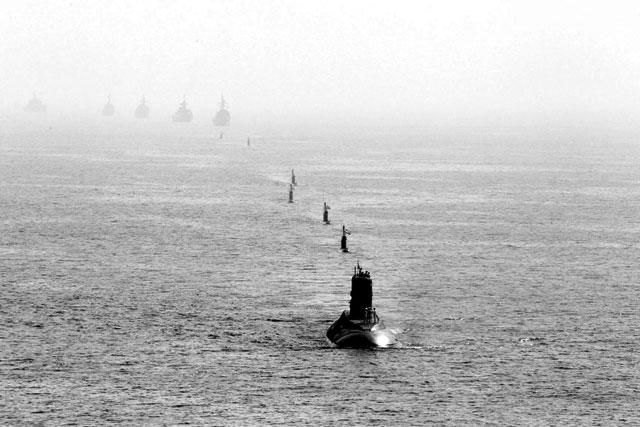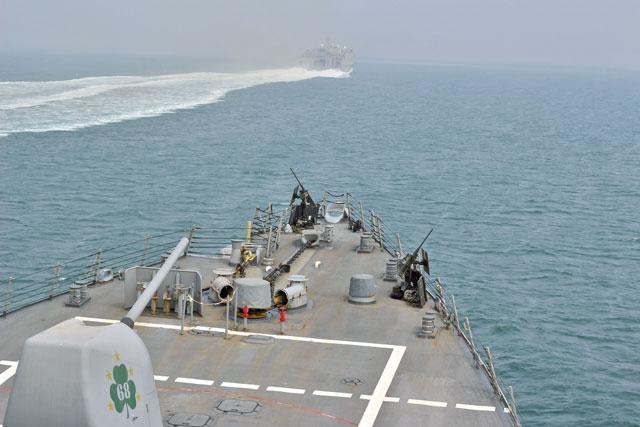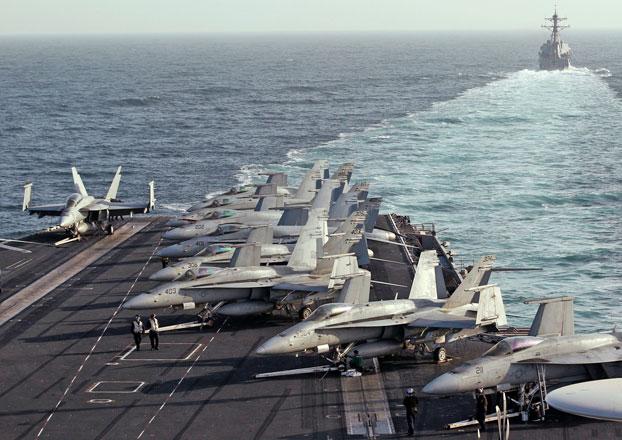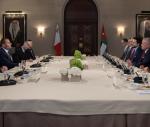You are here
Iran says it has many options to neutralise ‘illegal’ US sanctions — Tasnim
By Reuters - Feb 23,2019 - Last updated at Feb 23,2019

A handout photo made available by the Iranian Navy office on Saturday, shows Iranian navy submarines sailing during an Iranian navy drill in the Gulf of Oman, on Friday (AFP photo)
DUBAI — Iran said on Saturday it had many options to neutralise the reimposition of US sanctions on its oil exports, the semi-official Tasnim news agency reported, adding that Tehran's regional influence could not be curbed as demanded by Washington.
"Apart from closing Strait of Hormuz, we have other options to stop oil flow if threatened," Secretary of Iran's Supreme National Security Council Ali Shamkhani told Tasnim.
"Iran has plans in place that will neutralise the illegal US sanctions against Iran's oil exports," Shamkhani said. "We have many ways to sell our oil."
Tensions between Iran and the United States increased after US President Donald Trump pulled out of a 2015 nuclear deal between Iran and six world powers last May, and then reimposed sanctions on the Islamic republic.
The restoration of sanctions is part of a wider effort by Trump to force Iran to further curb its nuclear and missile programmes as well as its support for proxy forces in Yemen, Syria, Lebanon and other parts of the Middle East.
Washington had been pushing governments to cut imports of Iranian oil to zero. But, fearing a price spike, it granted waivers to eight Iranian oil buyers when the sanctions on oil imports started last November.
Iranian officials have threatened to disrupt oil shipments from the Gulf countries if Washington tries to strangle Tehran’s oil exports.
Carrying one-third of the world’s seaborne oil every day, the Strait of Hormuz links Middle East crude producers to key markets in Asia Pacific, Europe, North America and beyond.
“There are multiple ways to make that [blockage of Hormuz] happen. We hope we would not be forced to use them,” Shamkhani said.
‘Resistance front’
Iran — the dominant Shiite Muslim power which is in a rivalry with Saudi Arabia and the United States’ other Sunni Arab allies — has been President Bashar Assad’s most supportive ally against insurgents throughout the nearly eight-year Syrian civil war.
“We have achieved 90 per cent of Iran’s goals in Syria,” said Shamkhani, a close ally of Iran’s top authority Supreme Leader Ayatollah Ali Khamenei.
“There will be important developments in promoting deterrence capability of the resistance front in Syria,” said Shamkhani when asked about Israel’s “possible future attacks” in Syria, according to Tasnim.
Iran often refers to regional countries and forces opposed to Israel and the United States as a “resistance axis”.
Israel, increasingly concerned that its enemy Iran may establish a long-term military presence in neighbouring Syria, says it has carried out over 200 attacks against Iranian targets in Syria in the last two years.
Defying Israeli threats that they might be targeted if they do not leave the country, Iran says it will continue to provide military advisers to Syria for as long as necessary in support of Assad’s forces.
“Iran is capable of confronting any military threat... Trump and Israel are well aware of Iran’s military might,” Shamkhani said. “They know that they cannot enter a war with Iran. That is why they publicly threaten Iran.”
Related Articles
Iran has full control of the Arabian Gulf and the US navy does not belong there, the head of the navy of Iran's Revolutionary Guards, Genera
TEHRAN — Iran's Revolutionary Guard on Sunday unveiled a new naval ballistic missile with a potential range of over 700 kilometres, local me
LONDON — The US navy stands ready to ensure free navigation and the flow of commerce, the US military’s Central Command said on Thursday, as

















